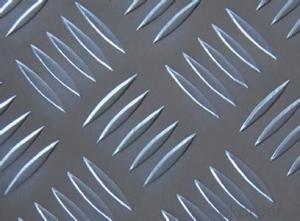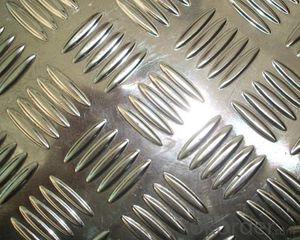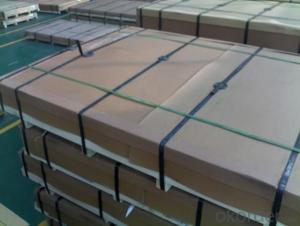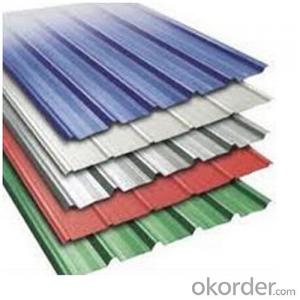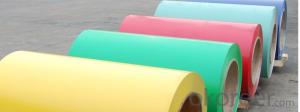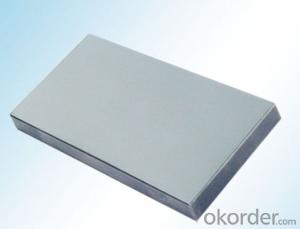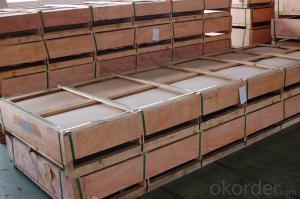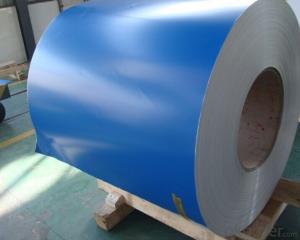Aluminium Checkered Plates for Decorative Application
- Loading Port:
- Shanghai
- Payment Terms:
- TT or LC
- Min Order Qty:
- 5 m.t.
- Supply Capability:
- 100000 m.t./month
OKorder Service Pledge
OKorder Financial Service
You Might Also Like
1.Structure of Aluminium Checkered Plates for Decorative Application Aluminium ceckered pates for dcorative aplication are one type of non-frame curtain wall than consist of glass panels, point-fixing components on such panels and their supporting structures. . Aluminium ceckered pates for dcorative aplication are good at ductility, heat conductivity, anti-corrosion and moisture resistance. They are widely used in roofing, electronics, instruments, lighting decoration, packing, decoration, curtain wall, sandwich panels, boats, etc. 2.Main Features of Aluminium Checkered Plates for Decorative Application •High intensity •Easy to be processed and shaped •Weather resistance •Anti-pollution & environment protection 3. Aluminium Checkered Plates for Decorative Application Images 4.Specification of Aluminium Checkered Plates for ecorative Application Alloy: AA1050, AA1060, AA1070, AA1100, AA3003, AA3004, AA3005, AA3105, AA5052 Temper: H14, H18, H24, H26, H32 Thickness: 0.2-20mm Width:10mm- 1500mm Standard: GB/T3880-2006, ASTM, ISO, EU standard 5. FAQ A.What about inspections to guarantee quality? For each order, we will arrange strict inspection for raw materials, inspection during production and inspection for finished goods. With requirement of customers, we also can arrange the third party inspection. B.What about delivery? We will put order in production schedule after order gets confirmed against copy of TT or L/C. Normally it takes about one month for production. Exact shipment schedule is different based on different sizes and quantity. C.What is the MOQ? 5 tons for each size. D. Where have you exported? We have exported to many countries. Main markets include South East Asia, Middle East, North America, South America, etc.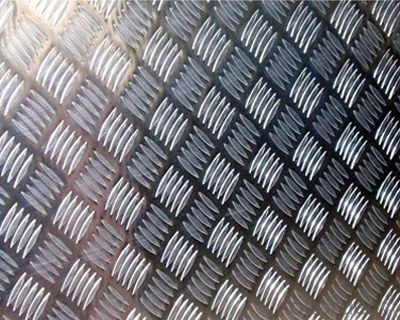
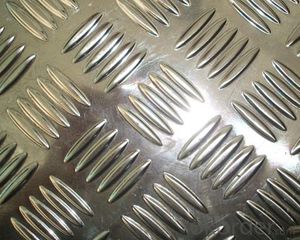
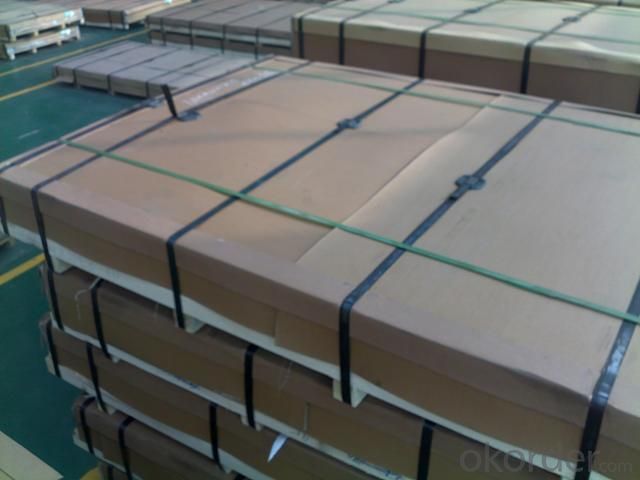
- Q:Can aluminum sheets handle high temperatures?
- Yes, aluminum sheets can handle high temperatures. Aluminum has a high melting point of 660 degrees Celsius (1220 degrees Fahrenheit), making it suitable for many high-temperature applications. Additionally, aluminum has excellent thermal conductivity, which allows it to quickly dissipate heat. This property makes aluminum sheets suitable for use in areas that require high-temperature resistance, such as engine components, heat exchangers, and oven linings. However, it is important to consider the specific alloy and thickness of the aluminum sheet, as different alloys may have varying temperature limits.
- Q:What are the different types of surface treatments available for anodized aluminum sheets?
- There are several types of surface treatments available for anodized aluminum sheets, including polishing, brushing, sandblasting, etching, and coloring. Each treatment option provides a unique aesthetic and functional finish to the aluminum surface.
- Q:there is a magnet for other type of nails except aluminum nails
- Not that I have heard of. The best way is manual hand pick up. If it is on concrete you might try making a pad out of a good stickey tape (turning the stickey part to the outside) that might speed up the process.
- Q:Can the aluminum sheets be used in food or beverage processing industries?
- Yes, aluminum sheets can be used in food or beverage processing industries. Aluminum is a non-toxic material, and it is widely used in the food and beverage industry due to its excellent properties. Aluminum sheets are resistant to corrosion, lightweight, and have good thermal conductivity. These properties make them ideal for various applications in food and beverage processing industries, such as food packaging, cooking utensils, storage containers, and beverage cans. Additionally, aluminum is a sustainable material as it can be recycled, which further enhances its suitability for use in these industries.
- Q:Can 101 aluminum sheets be used in the production of solar reflectors?
- Solar reflectors can indeed utilize 101 aluminum sheets for their production. Aluminum is a highly utilized material within the solar sector, owing to its exceptional reflectivity and long-lasting nature. The term "101" pertains to the specific alloy composition of the aluminum, typically indicating either pure aluminum or a low alloy variation. Pure aluminum possesses superb reflective qualities, rendering it an ideal choice for solar reflectors that necessitate efficient redirection of sunlight towards solar cells or panels. Nevertheless, it is crucial to take into account other factors such as thickness, surface finish, as well as any additional coatings or treatments that may be essential for optimal performance in solar reflector applications.
- Q:I have been doing this science prac at school and I have received some strange results. I measured the density of this metal, which leads me to believe it is Aluminium. Also, its silvery appearance supports this. When I have attempted to react it with Hydrochloric Acid, Sulfuric Acid and the nitrates/chlorides of a few metals, I have received some odd results.Despite having a high reactivity, the only substance it has reacted with so far out of all of the above is Tin Chloride. Am I doing something wrong? Is it possible that it isn't aluminium and rather a similar metal such as zinc? Thanks in advance :)
- Aluminum is very reactive so what happens is that it has a coat aluminum oxide as soon as it comes in contact with oxygen the outer layer forms aluminum oxide Al2O3. That is why Aluminum does not rust. The Al203 coat protects it.
- Q:Are aluminum sheets suitable for electrical enclosures?
- Yes, aluminum sheets are suitable for electrical enclosures. Aluminum is a lightweight and durable material that offers excellent electrical conductivity and corrosion resistance, making it an ideal choice for protecting electrical components. Additionally, aluminum's thermal conductivity helps dissipate heat generated by the enclosed equipment, ensuring proper functioning and longevity.
- Q:Can aluminum sheets be used for packaging?
- Aluminum sheets have the ability to be utilized for packaging purposes. The packaging industry highly values aluminum due to its numerous advantageous properties, as it is a versatile and extensively used material. The lightweight nature, strength, durability, and resistance to corrosion of aluminum make it an optimal choice for packaging applications. By using aluminum sheets, it is effortless to mold them into various shapes and sizes, offering the advantage of design flexibility and customization. In addition, aluminum possesses impermeability to light, moisture, gases, and microorganisms, guaranteeing the safety and preservation of the packaged goods. Its exceptional heat conductivity also allows for efficient heat transfer during processes like sterilization or pasteurization. Moreover, aluminum is environmentally friendly as it can be recycled, making it a sustainable option for packaging. All in all, aluminum sheets are a remarkable choice for packaging purposes due to their exceptional properties and versatility.
- Q:Are aluminum sheets suitable for food processing equipment?
- Aluminum sheets are indeed appropriate for food processing equipment. The food processing industry extensively employs aluminum due to its exceptional attributes. Being corrosion-resistant, lightweight, and possessing excellent thermal conductivity, aluminum proves to be ideal for situations where hygiene and effective heat transfer are of utmost importance. Moreover, aluminum is non-toxic and does not interact with food, thus guaranteeing that it does not compromise the taste or quality of the processed items. In conclusion, aluminum sheets are widely favored for food processing equipment as they fulfill the essential safety and performance criteria.
- Q:on an hot day, which will stay cooler longer...aluminum, or copper? why?thanks!
- Copper is a better conductor of both heat and electricity so it will get hotter faster at least until it oxidizes and turns green
1. Manufacturer Overview |
|
|---|---|
| Location | |
| Year Established | |
| Annual Output Value | |
| Main Markets | |
| Company Certifications | |
2. Manufacturer Certificates |
|
|---|---|
| a) Certification Name | |
| Range | |
| Reference | |
| Validity Period | |
3. Manufacturer Capability |
|
|---|---|
| a)Trade Capacity | |
| Nearest Port | |
| Export Percentage | |
| No.of Employees in Trade Department | |
| Language Spoken: | |
| b)Factory Information | |
| Factory Size: | |
| No. of Production Lines | |
| Contract Manufacturing | |
| Product Price Range | |
Send your message to us
Aluminium Checkered Plates for Decorative Application
- Loading Port:
- Shanghai
- Payment Terms:
- TT or LC
- Min Order Qty:
- 5 m.t.
- Supply Capability:
- 100000 m.t./month
OKorder Service Pledge
OKorder Financial Service
Similar products
New products
Hot products
Hot Searches
Related keywords
